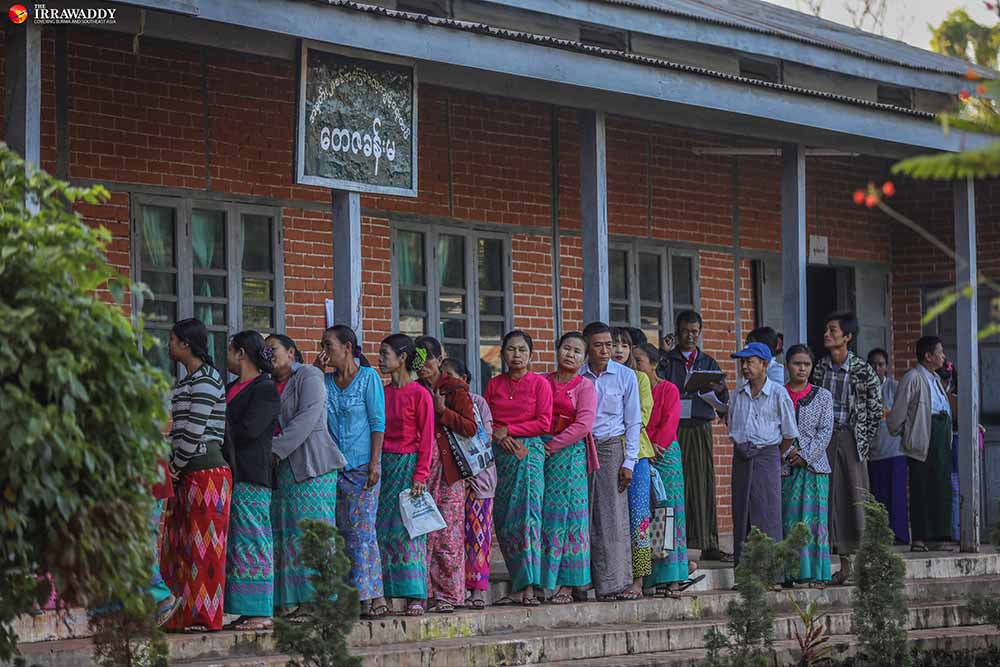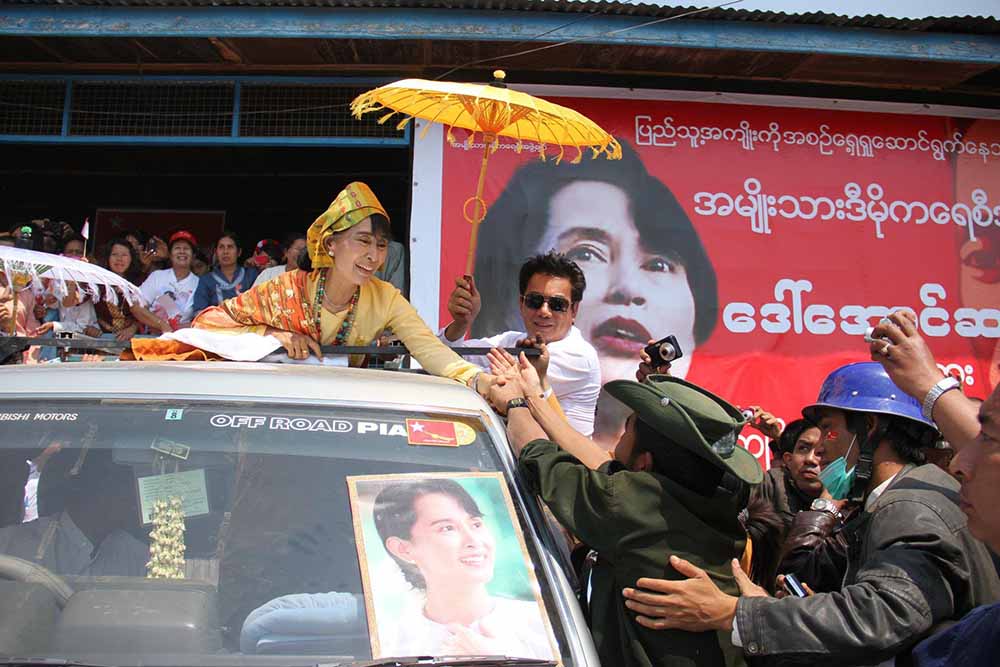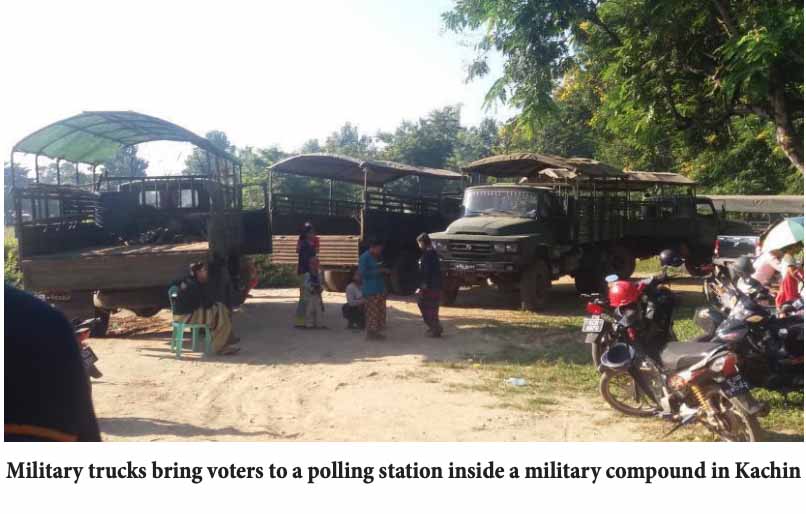YANGON—For the first time, Myanmar’s military personnel and their family members will have to cast their votes at polling stations outside their military compounds when Myanmar goes to the polls on Nov. 8. Parliament’s abolition of military polling stations this year has raised hopes that military personnel will feel free to vote for the candidates of their choice.
There are over 1 million military-affiliated voters in Myanmar, including both the armed forces’ estimated 500,000 personnel and their relatives. Until 2018, they could vote only at polling stations inside military camps under the watchful eyes of their superiors. Myanmar has held three general elections in the past nearly six decades, in 1990, 2010 and 2015, and three by-elections, in 2012, 2017 and 2018.
At first glance, military voters casting ballots at a polling station in a military compound may not seem a big deal.
But in Myanmar, where the military (or Tatmadaw) has maintained a long and deep involvement in politics through successive proxy parties, the setting up of voting stations on military bases has serious implications. Suspicions have long been raised that voting by military personnel is rigged in favor of the proxy party. The number of military voters across the country is substantial enough that manipulating their ballots could affect the outcome of an election. Transparency is a major issue, as most of the polling stations on bases are off limits to election observers for “security reasons”.
Given these concerns, political parties, including the ruling National League for Democracy, objected to the existence of polling stations in cantonment areas ahead of previous elections. Action was taken in May, when the country’s Parliament passed amendments to electoral by-laws resulting in the abolition of military polling stations on the grounds that they do not comply with the standards of a free and fair election.

“With military polling stations moving out, we can’t take it for granted that the NLD will win. But it gives military voters an opportunity to vote freely for the party they support,” NLD vice chairman Dr. Zaw Myint Maung told reporters on July 2, after the party’s Central Executive Committee meeting in Naypyitaw.
Former military officer U Kyaw Swa Win told The Irrawaddy that during a previous election he had witnessed cases of military voters being intimidated by their superiors to vote for the military’s current proxy party, the Union Solidarity and Development Party (USDP), whose leadership includes former senior military officers.
The ex-major, who was jailed and expelled from the army in 2014 for signing an NLD-organized petition in support of reforms to the military-drafted Constitution, served as a vote-counting officer at a military polling station in 2010.
He recalled how any ballot on which the voter had not selected the USDP was deliberately invalidated at his polling station, helping pave the way for the party’s victory.
“If the box beside the USDP was unticked, they personally added one more mark with a pen to turn it to an invalid vote,” he said, admitting that the soldiers were following the order of a commanding officer. According to voting guidelines, a ballot on which more than one choice has been selected must be rejected.
“So we only had two kinds of ballot: those for the USDP, and invalid ones,” he said, adding that, “As there will be no military polling stations now, this problem shouldn’t occur.”
Unsurprisingly, the 2010 election, which was boycotted by the NLD and many ethnic parties, was widely viewed as flawed. The USDP won a landslide victory in that election, becoming the ruling party in early 2011.
Political analyst U Ye Tun, who is also a former Lower House lawmaker for the Shan Nationalities Democratic Party, said there had always been questions over whether military personnel and their family members were free to exercise their own judgment when casting ballots under the eyes of their commanders.

Citing army colleagues, he said that in some cases in 2010 and 2015, military voters’ superiors simply cast ballots on their behalf.
Military voters in areas with a large Tatmadaw presence boosted the USDP’s results and in some places secured victory for the party.
In the 2015 general election, while the NLD won a landslide victory nationwide and secured enough seats to claim the presidency and form the government, the USDP won a majority of parliamentary seats in Shan State, which is home to large army troop deployments, even defeating the locally popular Shan Nationalities League for Democracy.
USDP spokesperson Dr. Nanda Hla Myint, however, disputed the claims of irregularities, saying that whether polling stations are placed inside or outside of military barracks has nothing to do with the party’s performance at the polls.
He pointed out that in 2015 his party lost to the NLD in garrison towns like Pyin Oo Lwin in Mandalay Region and Mingaladon and Hmawbi townships in Yangon.
“It doesn’t matter whether polling stations are inside or outside military barracks. Those who like our party will vote for us and those who don’t, they won’t,” he told The Irrawaddy.
However, his comments did not convince Gumgrawng Awng Hkam, the vice chair of the Kachin State People’s Party (KSPP), which was recently created from a merger of smaller ethnic Kachin parties.
In the 2018 by-election, Aung Hkam ran for an Upper House seat representing the capital of Kachin State, Myitkyina, under the locally popular Kachin Development Party’s ticket. But he finished second, losing to the USDP candidate. He said it appeared that all advance votes from a military cantonment in the city voted for the USDP, swinging the result.
With polling stations having been removed from the barracks, he expected there would be changes among the military voters.
“In a democracy, military voters should cast their ballots outside, rather than in, their compounds. Only this can ensure their families’ freedom to vote [as they wish],” he said, adding that it is a democratic right to vote for the candidate of one’s choice.
“What has happened in Myanmar is, I have to say, an injustice, as the military has been able to channel its entire vote to one party,” said he.
Awng Hkam said placing voting stations inside restricted military camps does not comply with democratic standards. He added that individual members of the military must be able to vote independently for the candidate of their choice in order for an election to be considered free and fair.
NLD Central Information Unit Secretary Monywa Aung Shin said the party secured victory in the above-mentioned garrison towns thanks to voters who lived outside of military compounds. He said that since the 1990 election, the military-backed party—known as the National Unity Party at that time—had seen landslides at military cantonment polling stations, with other parties winning very few votes.
He also pointed to problems with military polling stations in the by-elections in 2017 and 2018, particularly in Kachin and Shan states and in the Sagaing Region township of Tamu. At military compounds in those places the NLD never won more than one vote—in some places it won none at all, he said.
In the 2017 by-election the USDP won a regional parliament seat in Kengtung Township in Shan State, and in 2018 it won an Upper House Seat in Kachin State and a regional parliament seat in Tamu township of Sagaing Region. In those places, several polling stations were located inside military compounds.
“As the military voters will vote outside military barracks in the coming election, the NLD may win more votes,” political analyst U Ye Tun said.
Apart from military polling stations, advance voting is another concern.
Ex-major Kyaw Swa Win called on the election commission to develop clear procedures and regulations to ensure transparency in the advance voting process for the military.

In previous elections, there were reports of electoral fraud involving advance military voting. Even then Union vice president Sai Mauk Kham, of the USDP, was accused of manipulating advance votes in his constituency, Shan State’s Lashio, in the 2015 general election. The then state election sub-commission denied the accusation and stood firm on its official vote count.
Election observer groups said that while advance voting is hard to monitor at the best of times, advance voting by the military is even less transparent. In some cases, the ballots arrive directly from far-flung military bases where the commanding officers have sole responsibility for arranging advance votes and the number of people who cast such votes is unknown. This raises legitimacy issues such as whether the ballots were cast in secret, without intimidation and by the actual voters themselves.
Election observer Daw Mya Nandar Thin said the number of advance votes is always much higher at polling stations inside military camps than at civilian polling stations. She said that while there were difficulties accessing the military camps on election day in 2015, her group was able to conduct poll monitoring in some cantonment areas during the 2017 and 2018 by-elections.
“But we couldn’t assess casting of ballots during out-of-constituency military advance voting,” she said.
However, she is hopeful that advance military voting will become more transparent under the electoral by-law amendments passed in May, as the country’s Union Election Commission will now publish lists of voters who request advance voting. This should make it easier for observers and others to get an idea of how many advanced votes are out there.
Parliament’s success in amending electoral by-laws to bring polling stations out of military compounds was achieved over resistance from the military.
Military spokesperson Major General Tun Tun Nyi told reporters during a press conference in Naypyitaw late last year that it is difficult for both military personnel and their family members to leave their bases to vote, as they are on duty 24 hours per day.
As Parliament was debating the proposed changes to the electoral by-laws, Brigadier-General Maung Maung told reporters in Naypyitaw that it would cause security and transport problems in some places for military personnel and their family members to leave their military barracks to vote.
“I think this is wrong. There was no problem with the military polling stations in the 2010 and 2015 general elections; the elections were free and fair and that is why the ruling party is in power today. There is no reason for it.”
For all their resistance, however, the abolition of polling stations on military bases succeeded. According to Daw Mya Nandar Thin of New Myanmar Foundation, a local election observation group, the move will ensure transparency in the election process.
“Greater transparency will strengthen the credibility of the whole election,” she said.
You may also like these stories:
Weapons Seized in Mae Sot Destined for Myanmar’s Rakhine State: Intelligence Sources
Despite Myanmar Ethnic Parties’ Bold Election Strategy, NLD Insists on Going It Alone
One Year on, Still No Justice in Myanmar’s ‘Victoria’ Toddler Rape Case

















